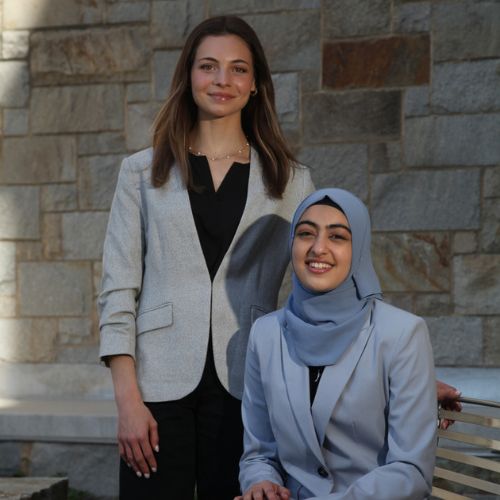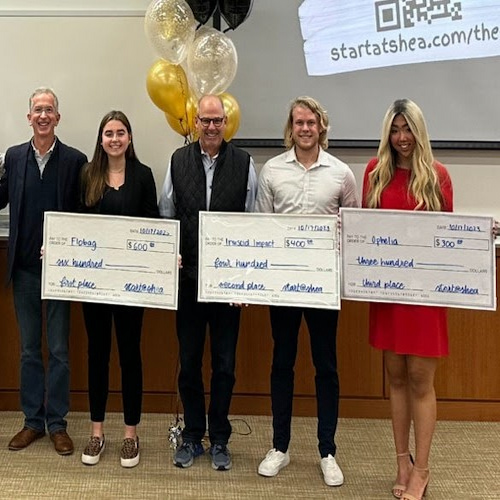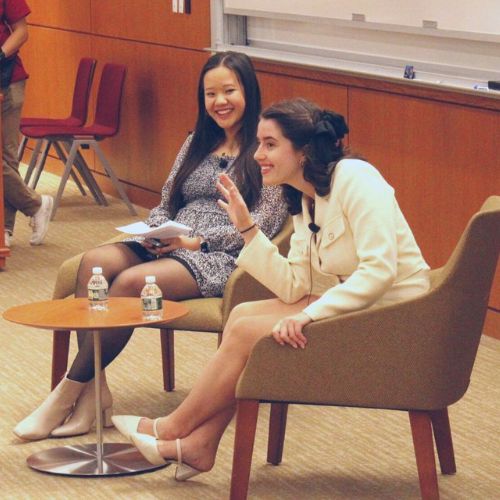As rain drenched the Heights on a Saturday morning in late September, the atmosphere inside 245 Beacon Street was considerably brighter. Members of the Edmund H. Shea Jr. Center for Entrepreneurship student leadership team Start@Shea bustled around the building putting the final touches on the second annual Solstice Conference just as the first registrants arrived. They adorned attendees with name tags, handed over swag bags, and jolted them awake with Red Bulls, before ushering everyone into the auditorium to commence a weekend-long exploration of entrepreneurship.
“We wanted to create an event that really resonated with students and young professionals,” says Seda Sargsyan ’25, a Solstice Conference co-lead and Start@Shea executive board member. That’s why this year’s conference organizers specifically wanted to curate their list of featured speakers with “an eclectic mix of both BC and non-BC entrepreneurs,” she added. While there was no overall conference theme, a special focus on women in business was apparent.
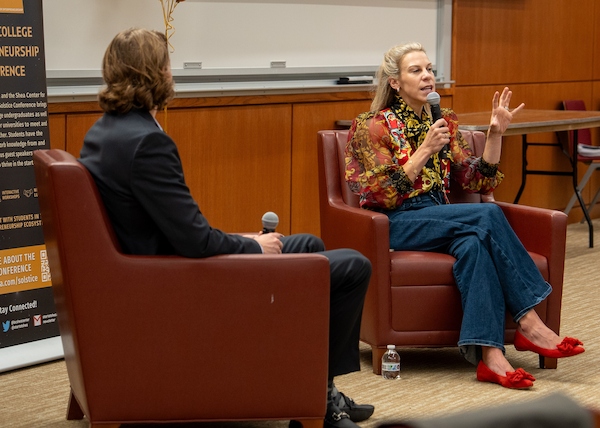
Caitlin Reimers Brumme, CEO of MassChallenge, in conversation with Chris Carrabes ’25
Over two action-packed days (compressed from three days in 2022), conference goers could fill their time with speeches, panel discussions, and interactive workshops with entrepreneurs like Jimmy McDermott ’21, LaDante McMillon, MCAS ’12, Bozhena Kulchyckyj ’22, and more. Overall, there was no shortage of opportunities to soak up wisdom from business leaders and innovators.
“Learning about what brings you energy is a great thing to discover,” shared Caitlin Reimers Brumme, CEO of MassChallenge, who kicked off the conference with a keynote conversation moderated by Chris Carrabes ’25, a Start@Shea marketing co-lead.
Before joining MassChallenge, an accelerator nonprofit that supports entrepreneurs and startups from non-traditional backgrounds, she was working in Venture Capital where she focused on mobilizing investment capital. However, she said it wasn’t until joining MassChallenge that she felt she had discovered her true calling and the satisfaction that comes from being close to people changing the future. Now she routinely gets to celebrate the courage it takes to bring a new idea to the world.
When it comes to career, a sense of urgency to get to the finish line is not always the right frame of mind, she advised, offering reassurance that sometimes it takes time to find a calling. “I have 30 to 40 more years of work—in Congress I’d have 60,” Brumme said, drawing laughs from the audience.
“I was sitting there thinking, ‘How can I use this for my own company?’,” says Solstice attendee Kyle Radimer ’25, who co-founded the app Musync, which connects musicians with venues and talent scouts. He and classmate Advaith Vadlakonda ’24 have found that having a tangible project to work on outside of class gives them purpose and makes the work feel exciting, as Brumme suggested in her remarks.
“It's nice to have someone tell us it’s okay” to be nervous about going out into the real world and starting a career after graduation, says Quinn Serpa ’24, who studies marketing and entrepreneurship. He felt that Brumme helped ease everyone's minds about the anxieties of the future.
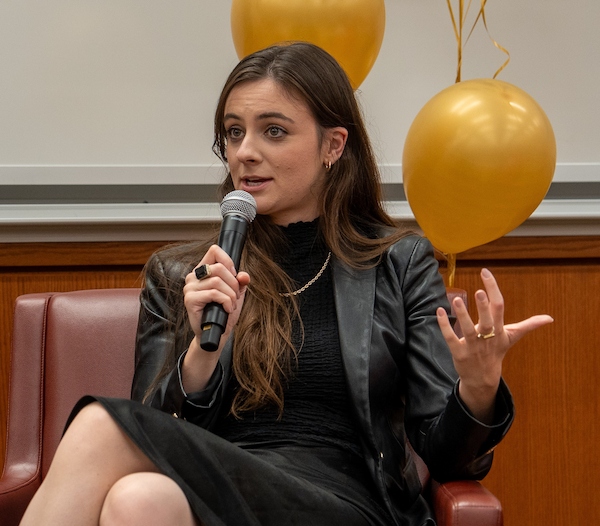
Emma Butler, Liberare CEO and founder
While the Solstice speakers came from all different entrepreneurial backgrounds, conference organizers hoped that each one would have relatable perspectives to share. For the young women in attendance, Saturday’s Innovate Her Way event was developed with them in mind. The panel conversation featured BlueConic CEO Cory Munchbach ’09, Liberare CEO and founder Emma Butler, and SoccerHead CEO and cofounder Gilda Doria. It was intended to “amplify representation and visibility for women in entrepreneurship, thereby encouraging more women attendees to pursue their ideas,” says Sargsyan.
“Being the only woman put me in a position to make points other people wouldn’t have made,” said Munchbach. She was the first woman employee of customer data platform BlueConic and the only woman on the executive team for years. “I threatened to get pregnant if we weren’t going to get everyone parental leave,” she confessed.
"It’s important to keep your eyes open and look at what others are going through because it benefits everyone,” Butler agreed. As the founder and CEO of disability-inclusive lingerie brand Liberare, she finds it especially important to advocate for an accessible workplace and ensure that all of her employees are accommodated and feel seen.
The discussion also underscored the hoops many women entrepreneurs have to jump through in order to thrive in their industries. Butler had difficulties securing investments for her business despite her early success, while her male counterparts attracted substantial fundraising without comparable revenue. Her solution was to begin cold-emailing investors with the gender-neutral subject line, ‘Brown University Founder.’ “[Then] I would write, ‘I don’t know anything about fundraising, can you tell me about it?’ and then they would invest,” she added. “Always ask for advice, not money.”
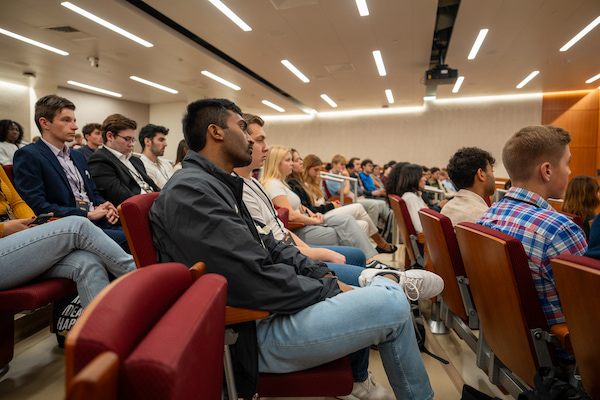
Students in attendance
Malaine Diop ’25, who is studying management and leadership, was thinking ahead to her own future business plans. “I’ve always thought about entrepreneurship and owning my own business,” she says. “It was cool to learn about different terminology and ways you can get funding for your startup.”
Later in the afternoon, attendees headed to the Moolah Kicks Ideathon for a chance to get hands-on with the day's ideas. Participants were separated into small groups and tasked with developing a marketing plan for Moolah Kicks, the women’s basketball sneaker brand founded by Natalie White ’20.
The prompt revolved around how the company could utilize college athlete endorsements in order to appeal to high school women’s basketball players, and without violating NCAA “Name, Image and Likeness” (NIL) rules and other endorsement contracts. Energy levels spiked as participants excitedly traded ideas and teams encouraged each other while plans were presented to a panel of judges—White joined the judging process via Zoom. The first-place team will get the chance to work with Moolah Kicks to execute their idea.
As the day wrapped up, attendees stuck around trading takeaways, comparing which events they were looking forward to on the second day of the conference, and engaging the invited speakers. Sargsyan looked on, taking in the scene. “We noticed that attendees stayed behind after events and had conversations with our speakers,” she says, clearly pleased. “We hope to implement a streamlined process to encourage more of that next year. It was wonderful seeing these types of personal interactions.”



